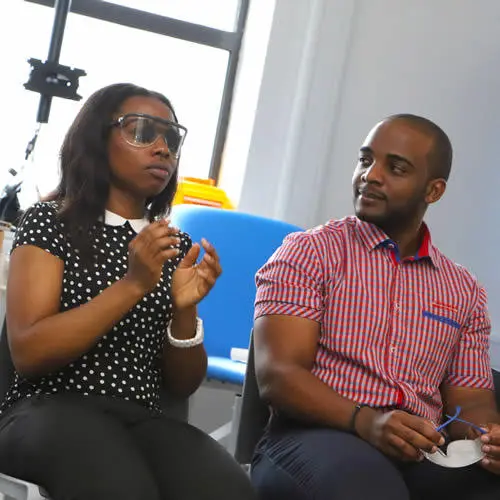UCLan medical students take a patient-centred approach to sight and hearing loss
Medical students from the University of Central Lancashire (UCLan) have been learning how to break down potential communication barriers when dealing with patients.
The 35-strong cohort worked with several local organisations and service users to understand the challenges faced by patients with issues such as sight and hearing problems, as well as learning effective ways to work with people who may need a language interpreter.
The session was designed to encourage the trainee doctors to think about their approach to patient communication and how they do this compassionately. Action on Hearing Loss, N-Vision (the Blackpool, Fylde and Wyre Society for the Blind) and UCLan’s service user and carer group Comensus worked with the students to explain how small changes can make big differences.
"Sensory loss isn’t easy to understand so sometimes it’s hard to know what extra help a patient or service user may need."
N-Vision Community Services Manager Judith Harrison said: “Sensory loss isn’t easy to understand so sometimes it’s hard to know what extra help a patient or service user may need. Trainee doctors need to take a patient-centred approach from the very beginning and I’m sure by seeing a situation from a patient’s view, it will make them think more carefully about how they deal with it.”
As well as speaking to representatives from the charities, the students also met service users who themselves have visual or sight impairments and took part in practical activities to challenge their own sensory awareness.
Second year student Brian Aine commented: “We take so many things for granted. Listening to people’s personal experiences makes me realise that such a small change in how I communicate with a patient could in fact make a huge difference.”

"We want to train doctors of the future who are mindful of barriers to communication. Our aim is to train high quality, patient centred doctors who can use their skills globally."
Dr. Jonathan Squibbs, Clinical Teacher from the UCLan School of Medicine, said: “We want to train doctors of the future who are mindful of barriers to communication. Our aim is to train high quality, patient centred doctors who can use their skills globally.”
UCLan medical school students undertake clinical placements in North West England. Clinical placements in secondary care are provided by NHS Trusts such as East Lancashire Hospitals NHS Trust (ELHT) and North Cumbria University Hospitals Trust. Primary care placements take place in regional GP practices and community settings across the North West. Campus based teaching takes place in UCLan’s multi-million pound facilities in Preston, Burnley and Westlakes in Whitehaven.

